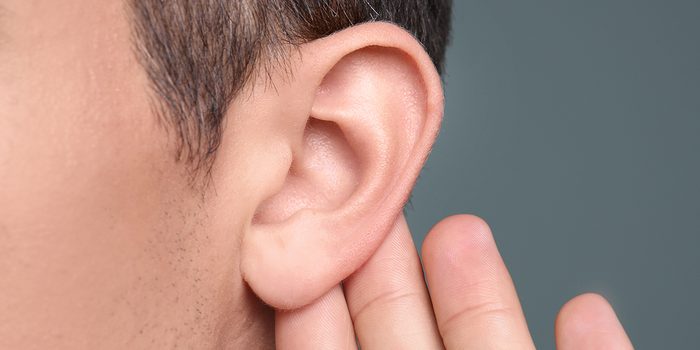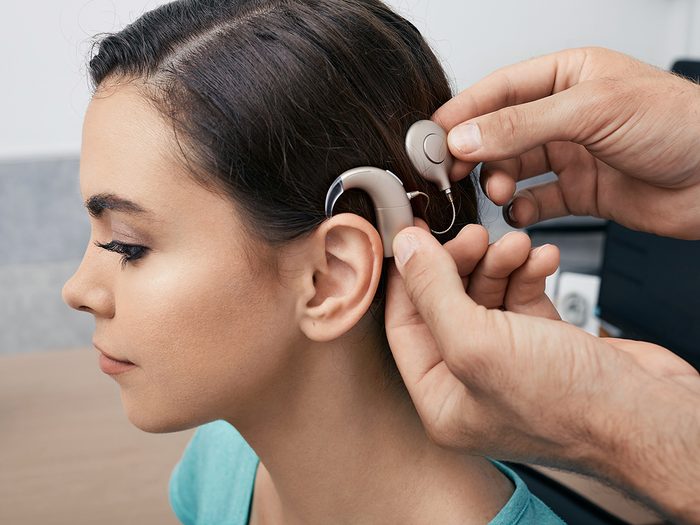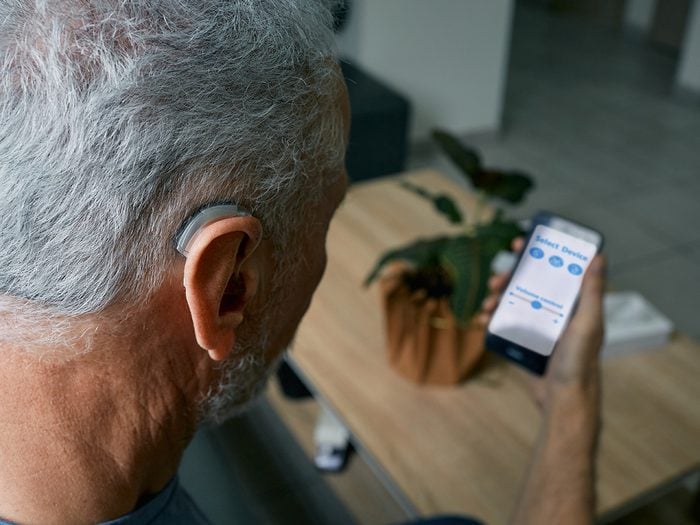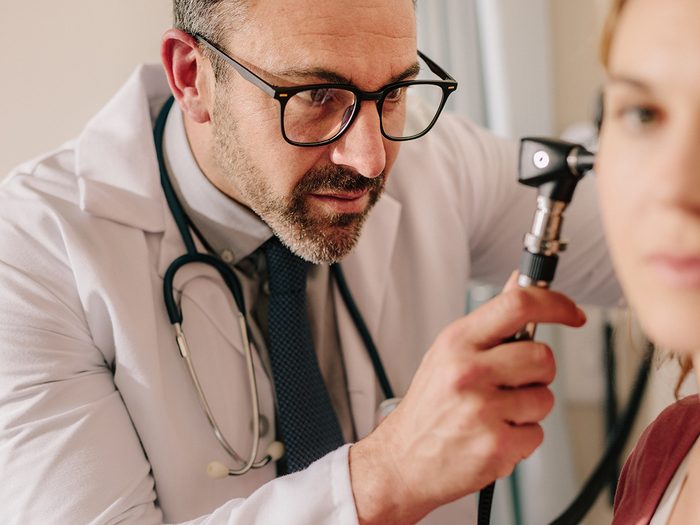
The Science Behind Hearing—And Hearing Loss
“Hi, Vanessa! Nice to see you!” It feels good to hear those words when I see people I know. But I take it for granted that I have even heard that greeting—and, in fact, all other sounds. I never think about how I’m hearing things, how my brain is translating sounds into meaning.
Yet the process is fascinating. The journey of a sound from outside the ear and into the brain, which takes only milliseconds, is mind-bendingly elaborate. First, the sound waves enter each ear and vibrate the paper-thin eardrum. That vibration moves two small bones that sit behind it, which begin to dance in sync with the sound waves’ vibrations.
Then a third bone sitting against the cochlea starts to vibrate, and things get really interesting. The cochlea is a pea-sized, bony structure shaped like a snail shell and filled with fluid. It’s lined with tens of thousands of hair cells topped with bundles of miniature tubes called stereocilia. That vibrating third bone beats against the cochlea, like knocking on a door. The cochlea’s fluid sways, and the hair cells wave like sea anemones. That movement causes the hair cells to release chemical neurotransmitters, triggering a series of electrical messages that are carried through the auditory nerves into the auditory cortex of the brain, which translates the electrical code into meaning.
The delicate stereocilia and hair cells have a limited lifespan. We start to lose our hearing because, as they’re used again and again through a lifetime of exposure to sounds at regular volume—or a shorter-term exposure to loud sounds—they can become damaged and stop doing their job. Called presbycusis, this age-related, or sensorineural, hearing loss is the most common.
If I had mild to moderate presbycusis, certain consonants would be more difficult to discern, so “Hi, Vanessa. Nice to see you!” would sound like “…i Vane…a. Nice ..o ..ee you!”

Can Hearing Loss Be Reversed?
According to the World Health Organization, about 1.5 billion people have hearing loss, and that number could rise to 2.5 billion—or one in four—by 2050. People with profound hearing loss can now turn to cochlear implants (above). That’s when an electronic cochlea—a combination of a transmitter and a processor—is placed behind the ear, and a receiver is surgically inserted under the skin there.
Aside from age-related hearing loss, there are a couple of other, less common, types. One that can actually be reversible—if it’s treated early enough—is sudden sensorineural hearing loss. It can happen instantly or over the course of just a few days. There are a variety of possible causes, including infections, head trauma and autoimmune disorders. It often affects only one ear.
The condition is typically treated with corticosteroids, drugs that fight inflammation, reduce swelling, and help your body fight off diseases. The medication is either injected directly into your ear or given orally as pills. This treatment can reduce or even reverse the hearing loss, but only if it’s administered quickly.
“I know many people who have had sudden hearing loss in one ear and thought it was nothing,” says Susan Scollie, who is a professor at the School of Communication Sciences and Disorders and director of the National Centre for Audiology at Western University in Ontario. It’s fortunate, she says, that there is a treatment, “but if you wait too long, the hearing loss can be permanent.”
For more moderate hearing loss that happens over a longer period of time, the standard treatment is hearing aids, and though they help a lot, many people who use them report that decoding speech in places with lots of background noise is still a challenge.
Here are the signs of hearing loss you might be ignoring.

The True Impact of Hearing Loss
But is it such a big deal if we can’t hear certain sounds? Yes, as it turns out. The true impact of hearing loss has been the subject of lots of new research and is becoming increasingly clear: it’s not just an annoyance, but a major health issue.
“For a long time, hearing loss was seen as an inevitable part of aging, and relatively inconsequential,” says Frank Lin, director of the Cochlear Center for Hearing and Public Health at the Johns Hopkins Bloomberg School of Public Health. “But over the past decade, that’s really been turned on its head.”
Researchers have now connected hearing loss with other health problems. Studies have found that it can more than double the likelihood of having a fall, for example, and can lead to anxiety and problems sleeping.
People with hearing loss are also at risk of mental illness: a 2020 Australian review published in Gerontologist looked at 35 studies covering almost 150,000 people and found that hearing loss was associated with a higher risk of depression in older adults. They suspect that people who lose their hearing don’t go out and socialize as much—perhaps because they have a hard time following conversations where there is background noise—contributing to increased feelings of loneliness.
We have long known that living in isolation may be the reason hearing loss has been linked with loneliness and depression; research has shown that isolation contributes to mental illness and also increases the risk of dementia.
There is also a strong link between hearing loss and dementia. A 2020 report published in The Lancet identified 12 modifiable risk factors for dementia—and ranked hearing loss as the most significant one for middle-aged people. It recommended that people with hearing loss use hearing aids to mitigate its negative cognitive effects.
The reason for the link could be that people who socialize less have fewer cognitively challenging conversations. Those with mild hearing loss are twice as likely to develop dementia; moderate hearing loss means it’s three times as likely; and people with profound hearing loss are five times more likely.
While hearing aids can’t reverse these things or give us the same quality of hearing we once had, they might help prevent the mental-health effects.
Lin is currently running a large trial to see if using hearing aids reduces the risk of dementia, and whether or not they can help decrease the incidence of falls. The results, due around mid-2023, will tell us, for the first time, whether interventions to prevent hearing loss have reduced the risk of these other issues.
Learn to spot the early signs of dementia.

Gene Therapy to Restore Hearing?
Other solutions are in the works. Researchers are looking at ways to help people regrow the cochlea’s hair cells and stereocilia cells to restore hearing. Some have taken inspiration from the animal kingdom: When birds and reptiles suffer from hearing loss, they regrow those cells, and can hear again within a few weeks—just as our bodies regularly grow new skin cells.
New hair cells in the cochlea would mean that, instead of just turning up the volume of all noise, as hearing aids do, we’d be able to hear naturally, and easily pick out speech from background noise.
So how might this be done? By harnessing our own genes. About half of age-related hearing loss has a genetic component, says Richard Smith, a physician and director of the Molecular Otolaryngology and Renal Research Laboratories at the University of Iowa. His group offers gene testing to people with hearing loss to try to pinpoint the reason behind it, which he says provides more insights into how their hearing loss will progress.
Smith is confident that in the future, genetic testing will become more common around hearing loss, and new solutions will be available for those issues, offering a personalized approach that’s different for each patient.
“There’s a tremendous sense of excitement on the research side as we move forward with different types of gene therapy for hearing loss,” he says. “I hope that people recognize that in the not-too-distant future we may have options besides hearing aids and cochlear implants.”
Decibel Therapeutics is one company that is working to make that future a reality. It’s trying to come up with gene-based solutions for hearing loss in adults.
“The idea is that you might be able to use gene-therapy technology to regrow the hair cells that have been lost,” says Jonathon Whitton, audiologist, neuroscientist and senior vice-president of clinical research and development at Decibel Therapeutics in Boston.
The company is researching half a dozen gene-therapy products, three of which target hair-cell regeneration. The others tackle single-gene causes of hearing loss and protecting hearing in people about to undergo a type of chemotherapy that often leads to hearing loss. Two of the treatments have moved on to the clinical-trial phase, and others that show promise will follow within the next few years.
Whitton says the advent of regenerative medicine has given scientists, health-care practitioners and patients “an emerging spirit of optimism.”
Find out how stem cell therapy is saving lives.

The New Hearing Aids
As potential innovations work their way through the clinical pipeline, there are better mechanical options than ever before: next-generation hearing aids.
Digital hearing aids have come a long way since their introduction in the mid-1990s. “We have gone from the first generation of digital hearing aids to fourth- or fifth-generation ones, and there have been a lot of improvements,” says Western University’s Scollie.
“Many of the improvements have been small, but they add up to a better-quality product. The single hearing aid that people receive today is the technological equivalent of seven or eight hearing aids all in one.”
An important one is the ability for hearing aids to automatically switch modes depending on the environment that you happen to be in: for example, changing how they would work when you’re in a quiet car listening to music versus in a crowded restaurant listening to a conversation.
They also have noise-reduction capabilities, and microphones that change direction automatically. “It’s like several hearing aids at once, moving back and forth seamlessly,” says Scollie.
The newest features also include Bluetooth, which can be connected wirelessly to a phone to have a conversation or stream music. It’s easier to hear when the voice on the other end of the phone comes through both ears, says Scollie, and it’s just more convenient to be able to use hearing aids as high-quality headphones, as well. It’s also possible to log in to an app to adjust the settings of your hearing aid.
A few hearing aids even do step counting, says Scollie, and she expects biometric sensors to be the next big development. This means that hearing aids would measure heartbeat and body temperature like a smartwatch does. “Measuring some of those things in the ear is actually a more appropriate location than the wrist,” she explains.
Test your knowledge of health terms with our medical trivia quiz.

More Affordable Hearing Aids
New regulations in the United States in 2022 have made over-the-counter hearing aids a reality; it’s thought that Canada might follow its lead. The United Kingdom, and many countries in Europe, already offer the option.
This means that instead of going to an audiologist and getting a hearing-aid prescription, similar to the way we get a prescription for eyeglasses, consumers can now buy these less-expensive versions without a prescription.
The development comes with some caveats: what if a person’s sudden hearing loss is caused by an illness, for example, that needs to be treated promptly if it’s to be reversed? Others worry that people who buy over-the-counter hearing aids won’t get the personal fitting, adjustments and follow-up service they might need.
But on the positive side, these over-the-counter products could also act as a gateway for people who might not otherwise buy hearing aids. One study estimated that more than 80 percent of Americans with hearing loss don’t wear hearing aids.

Looking Forward
Hearing loss runs in my family: my grandparents needed hearing aids, and my father uses them. One day I may need them, too. His are much more advanced than my grandmother’s were, complete with Bluetooth and the ability to “tune” to different situations, like crowds.
But they’re still not perfect in noisy environments. I ask Decibel’s Whitton whether he thinks it’s possible that, by the time 40-year-olds like me are in their 50s or 60s, we might be able to use medication, not technology, to reverse hearing loss?
“Yes,” he says, pointing out that there is growing interest from researchers trying to solve this problem. “All these companies are being built around the idea that we can get there.”
Now that you know how hearing loss can be reversed, find out why you need to stop cleaning your ears with cotton swabs.